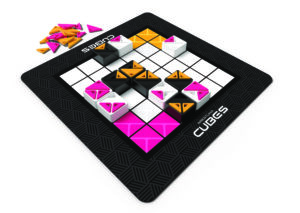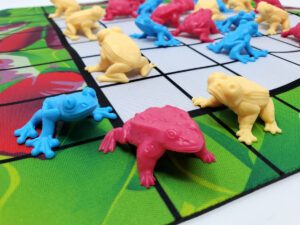Throwing a Loop Into Game Music
Imagine if Star Wars had opened up with a fanfare of kazoos and slide whistles instead of John William’s powerful and timeless masterpiece. Then try imagining if Nintendo had hired the punk band Screeching Weasel to do the score for Super Mario Bros. It might have worked. More likely than not it wouldn’t have. It just wouldn’t have been as fun, at least. Music can make a game or movie great, but it can also send it to the depths of obscurity if it’s bad enough.
Creating music for games takes time, like all good things do, and it is often done later in the process once the mood of the game has been set. You don’t want to be composing epic orchestral music for a game that turns out to be a comedy.
For our game Hexapod Defense Force, we asked our friend Glen Moyes to compose us some music. He played our game and got the idea for a techno soundtrack that would fit the alien invasion theme. The songs he made started off with a dark tone, which warned the player of an imminent alien attack and would shift again when the boss was about to appear. It really made the environment come to life, giving you this feeling that everything was falling apart but that there was still hope for mankind or alienkind or whateverkind. It also had funky dance beats that brought everyone out to the floor. Seriously. We took the game to a conference down in Salt Lake City and caught more than a few people grooving along to the vibes. Glen’s Doom vibes.
Who gets down to doom vibes anyway?
Crazy people.
Or awesome people. Maybe I’m just missing out on something.
By the way, you can check out Hexapod Defense Force at hdfgame.com.
Making Loops
One unique aspect of making music for games is making music that is able to loop for ever and ever. I tried doing this in Garageband at first, and it turned out to be a disaster because it exported all of my tracks at uneven lengths, and everything would just get out of sync when they were played in the game. I then turned to Audacity, which allowed me to specify how long I wanted each track to be, and I exported all of my tracks from there. It’s actually super easy once you figure out how to do it. Just reference the below picture:
For a game that we are working on, we decided to use loops, making it so whenever a player went further in the game he or she would unlock more tracks to the loop. So you start the game and all you hear is a drum, and then as you progress, you get chimes, a piano, strings and so on. I had never seen anything like that done in a game before (please excuse my ignorance) and was super excited to see that it actually worked! You can check it out in our game BOCO (it’s current and hopefully last title, but that’s another post), which should be released soon.
Here you can listen to the menu music track that I created for BOCO, if you wish!
Loops are fun to make, especially after you learn how to make them work. They can be pretty frustrating up until that point. And like I mentioned before, Audacity is awesome when it comes to editing tracks. Try it out! It’s free on the internets:
http://audacity.sourceforge.net/download/
As for creating music, just go out and collect as many sounds as you can. For one of our songs, I tapped on a desk, put some reverb on it and made it into a loop. Then I played my acoustic guitar over it. Glen went out and bought an electric guitar and learned how to play it for the songs he made for us. One of my favorite bands sampled themselves hitting a baseball bat with drum sticks for one of their songs. It sounded awesome.
So go sample some egg sounds!
Crunch down on some peanuts!
Throw a bath sponge at the stove!
Just don’t break anything that’s not yours. And don’t throw anything at the TV. I’ve seen those destroyed before in the process and it’s just a little awkward when people come home and they can’t watch Cupcake Wars.
Make your music sound balanced and professional as well. Take time to master it so it doesn’t overpower everything else in the game. Making sure game sound effects don’t get lost in the soundtrack is also good. It takes a lot of trial and error work, but it makes a difference in the end.
Happy music making!





